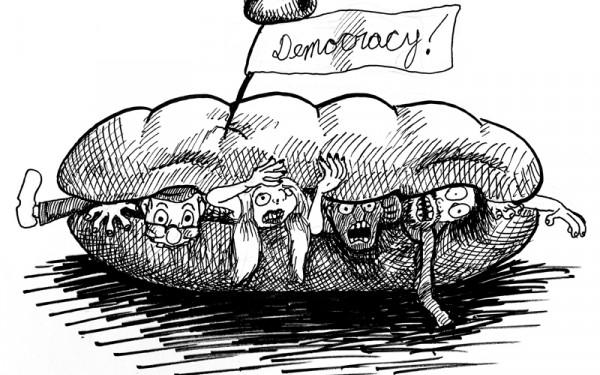CASA Considering Online Voting
Student Association Wants to Increase Election Participation
Student engagement in the Commerce and Administrative Student Association is low.
Only 488 of their 7,000 members showed up to vote during their last election in February. at’s only 6.9 per cent. The minimum to meet quorum is 2.5 per cent.
Online voting could change all that.
CASA’s Vice-President of Academics Shaumia Suntharalingam and Rory Blaisdell of the organization’s Board of Directors think online voting could increase the single-digit turnout rate.
Hidden in MyConcordia, within the Student Services menu, sits an application called “My Vote.” While currently unavailable to students, it is a system used by Concordia staff for surveys, according to Blaisdell.
Video Rory Blaisdell
Concordia’s IT organization, Instructional and Information Technology Services, will make sure that the online system works just like the physical one. IITS can activate the system within a week for eligible student voters. Students can only submit their electronic ballot once.
CASA students can only vote on issues that affect their own major. IITS can verify account login to help prevent election fraud.
“If multiple people are simultaneously logging in to the same computer, they have those types of checks in place,” Blaisdell said. The system will also show the results instantly. That takes a load off from the Chief Returning Officer and Deputy Returning Officer, who would have otherwise had to stay up counting votes overnight. But not everyone is on board with the plan. Some members of CASA’s Board of Directors are afraid students will forget to vote if there aren’t physical voting booths
at school.
Suntharalingam proposed using a physical booth with a computer to serve as a reminder of the elections. It would also allow students to log into their MyConcordia portal on the spot to vote.
“Most of the marketing is done online,” Blaisdell said. “That doesn’t work if you’re saying go vote online and the person that you’re marketing to has to do an action later, on a separate day, at a separate time, offine.”
“Most of the marketing is done online. That doesn’t work if you’re saying go vote online and the person that you’re marketing to has to do an action later, on a separate day, at a separate time, offine.” – Rory Blaisdell, independent director, CASA Board of Directors
CASA’s Vice-President of Marketing Arti Sadhwani wanted to know if My Vote had been tested. The VP was worried the system would crash.
The My Vote system will be tested this week to address her concern.
“During registration, there’s a whole bunch of students logging in at the same time to register for their courses,” said Suntharalingam. “If it can withstand registration, we have no doubt that […] it can handle elections.”
After the test, the CRO will decide if CASA will use the system. Blaisdell added that if the Board of Directors really like the system, they could force the CRO to use it.
CASA isn’t the only student group with a student engagement problem.
Only 700 of the Concordia Student Union’s 35,000 members showed up to vote during November by-elections.
Similarly, the Arts and Sciences Federation of Associations has failed to meet their 2.5 per cent quorum twice in the last two years.
“We’d really like to see this get adopted across the board,” Blais- dell said, adding that CASA has discussed using My Vote with the Engineering and Computer Science Association.
“We had a thorough research report produced in 2014 or 2015 on voting mechanisms, which advised against e-voting,” said CSU General Coordinator Lucinda Marshall-Kiparissis. “We’re still going on that recommendation.”
The polling period for the CASA elections is from Feb. 15 to 20. e Board of Directors will decide whether or not to use My Vote at a meeting in early February.

_900_639_90.jpg)
_600_832_s.png)

_600_375_90_s_c1.jpg)

_600_375_90_s_c1.jpg)
_copy_600_375_90_s_c1.jpg)